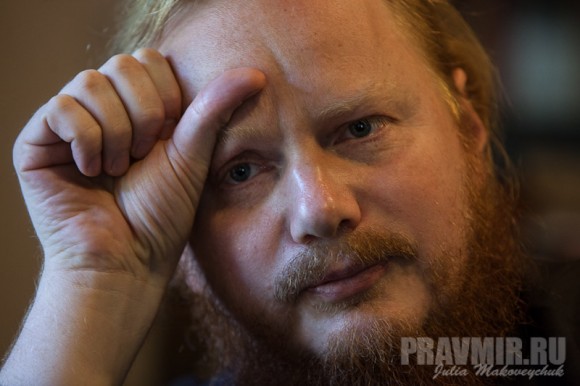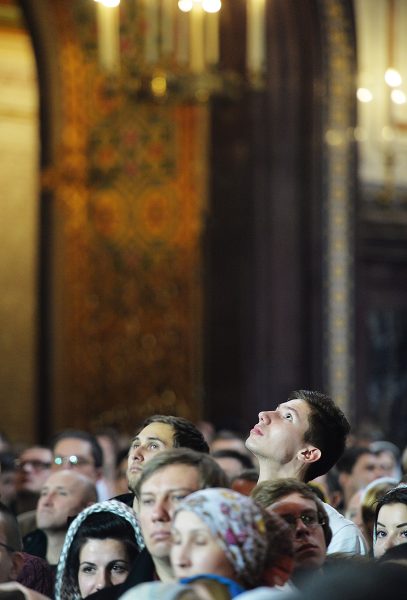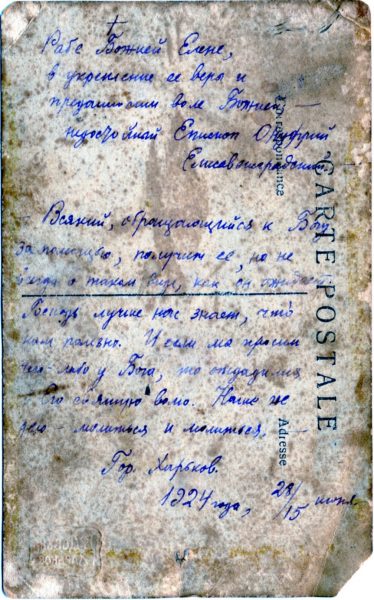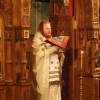The way it was done by the Apostles.
– Your Grace, can you answer the question, why everything takes so long with the Orthodox? Prayers before Communion, services, Akathists, Canons… After all, the Lord never said anywhere in the Gospel, “Pray as long as possible.” On the contrary, “Our Father,” the prayer that He gives people, is extremely short and concise (Mtth. 6, 9-13). At the same time, Christ reproached the Pharisees with making long prayers for a pretence (Mtth. 23, 14) and warned the Apostles, “And when you pray, do not use vain repetitions as the heathens do. For they think that they will be heard for their many words. Therefore, do not be like them. For your Father knows the things you have need of before you ask Him” (Mtth. 6, 7-8).
So, does that mean we are like the Pharisees and the heathens?
– The last words you quoted were in fact pivotal. As we see from the text, heathens prayed for mundane things, and for that reason the Lord advises that the Heavenly Father knows our needs even before we ask Him. He goes on to say, “For after all these things the Gentiles seek. For your heavenly Father knows that you need all these things.But seek first the kingdom of God and His righteousness, and all these things shall be added to you” (Mtth. 6, 32-33).
Why is it in fact advisable, especially during the stage of becoming churched, to say one’s prayers by the prayer-book, that is, to use texts written by holy men? Because in them, all the petitions pertain to the Kingdom of Heaven. Imagine what we would have prayed for at the time we first believed in the Lord, when we had not yet immersed ourselves in the depths of the Gospel or experienced the loftiness of the words of Christ. Obviously, we would have asked for what seemed important, what we usually wished for ourselves and for others: health, well-being, personal happiness. Yet, that is basically what the Lord warned us against.
Here however we have the words of the wonderful prayer of St. John Chrysostom that is read every evening, “O Lord, deprive me not of Thy heavenly good things. O Lord, deliver me from eternal torment. O Lord, if I have sinned in mind or deed forgive me. O Lord, deliver me from all ignorance, forgetfulness, faintheartedness, and stony insensibility…”
All petitions relate to the improvement of the soul, to our relationship with God, to Whom we really do turn to as our Heavenly Father, Who knows our private problems and doesn’t even need to be reminded of them, yet we ask Him only for the things that we need in order to be with Him in eternity.
As for denouncing the Pharisees who prayed a lot, this is what it’s all about. In those days, the Pharisees aspired to the highest level of righteousness and drew attention to this aspiration in every possible way. There were certain special prayers and traditions of worshipping God. For example, like with modern day true believing Muslims, who at the appropriate hour, unhesitatingly lay down their rug whether they are in an airport, an office, an institution or someplace else, and say the appropriate prayers. We, Christians, who for the most part are too embarrassed to cross ourselves before a meal or when passing by a church, who are afraid to embarrass those around us by refusing non-Lenten food on a fasting day, should emulate this confession of the faith. All those things have nothing to do with humility, there’s no humility at all there, we are simply ashamed to avow we are Christians. Yet Christ said, “For whoever is ashamed of Me and My words in this adulterous and sinful generation, of him the Son of Man also will be ashamed when He comes in the glory of His Father with the holy angels” (Mk. 8, 38). And no one revoked Christ’s words.

Bishop Iona (Cherepanov). Photo by Iulia Makoveichuk.
However, to return to the Pharisees. They saw prayers at appointed times as related to specific rituals, not as an avowal of the faith, but as showcasing their piety. This is actually what the Lord reproaches them with.
Now, as to why everything takes so long with the Orthodox. Our prayers have not appeared out of nowhere – our modern worship is based on the worship of the Old Testament. In the Acts of the Holy Apostles we read that the first Christians gathered in the temple in Jerusalem, in the synagogues, i.e. they participated in services, “And daily in the temple, and in every house, they did not cease teaching and preaching Jesus as the Christ” (Acts 5, 42).
It also says that when the Holy Spirit came down they “continued daily with one accord in the temple” and broke bread from house to house (Acts 2, 46). Which means that first they prayed and then performed the Eucharist, the breaking of the bread in remembrance of Christ. The daily cycle of Orthodox worship consists of the Hours, Vespers, and Matins. The Liturgy is not a part of it; it is outside everything, because it is the Mystical Supper, during which we commune of the Body and Blood of the Lord Jesus Christ. The daily cycle may be compared with the prayer the Apostles performed daily continuing with one accord in the temple, while the Liturgy with the special service they performed separately from house to house.
Moreover, it is written that they continued in the temple daily. They did not stop by just to read “Our Father…” On the contrary, they participated in the entire worship cycle, which consisted of readings from the Holy Scriptures and other prayers. Do you remember why the Deacons were ordained? So that they would not be distracted by household issues, but would remain “continually in prayer and ministry of the word” (Acts 6, 4). All of this also shows that the services were not short.
Yes, “Our Father” – the Lord’s prayer – shows us what we should be praying for. And, really, all the other texts that appeared in the Christian community seem to be its extended version. The essential remains unchanged – we pray to our Lord that we remain with Him in His Kingdom, and all the rest shall be added.

Photo: patriarchia.ru
What can we exchange the beauty of worship for?
– In cities, in villages people have so much to do, while the long services on Saturdays and Sundays leave practically no time for anything. Why can’t we make them shorter according with the pace of the rhythm of life of modern-day people?
– If we look at the community of the first Christians, the Scriptures emphasize that they gathered daily, spent time praying.
Yet, these days even people with a lot of free time, with a flexible working schedule, do not attend church every day. At best, they come on Saturdays and Sundays. We cannot say if it is good or bad, that’s just how it is. The necessity of participating in worship has been reduced to Liturgies on Sundays or on special feast days. Christians basically no longer celebrate Saints’ feast days, nor listen to the wondrous hymns, nor learn from texts, which mentally exalt Martyrs, the Venerable and Righteous. Daily interaction with God has been reduced to short morning and evening prayers. So, I think, the Church has already reorganized everything as much as possible to suit modern needs.
People often say, “It’s cruel, we work all week long, and on Saturdays, instead of resting we have to attend services…” You know, I feel sorry for the people who coolly and consciously deprive themselves of the beauty of the hymns dedicated to the Resurrected Christ. For there is little that distinguishes a weekday Liturgy from a Sunday Liturgy, but all the reasons why that day is actually called “little Pascha” are concentrated in Vespers and Matins, served, according to established tradition, on the eve of Sunday. And if a person takes everything read and sung in church seriously, trying to make sense of it all, to live it, it would never even occur to them to exchange the beauty of the worship for any other activity.
– Aren’t the long services and prayer rules those same “hard to carry burdens” that are laid on the shoulders of the faithful, which the Lord spoke about in the Gospel?
– If prayer is a burden to a person, it means they simply do not love God. No matter how cruel this may sound.
I already mentioned in another interview that when people are in love, they always want to spend time with each other, to interact with each other. They find joy in simply sitting next to each other, in looking at each other.
So, if a person feels no need to speak to God, it means they don’t love God. It is an awful condition.
Think back each of you to the time of your neophytism, when you ran to church, prayed in the morning and evening, how sad it felt to conclude this prayer, how you wanted to speak to God again and again. Yes, we know, that that was the call of Grace; when during our first steps, the Lord was showing us the correct attitude of the human soul towards God – how to pray, how to live, how to organize communion with God. At the time, it was as though we saw the standard – this is what it should be like; aspire to this.
Eventually, the Lord withdraws this Grace, so we can acquire it ourselves, so we can learn to work, to strive in that direction. Obviously, it won’t work all the time, but, bearing in mind the joy of being with God, we will aspire to get back what we have lost. And seeing our conscious longing, by our efforts the Lord will definitely send us Grace, but it will happen only when the realization of the joy of communion with God will do us no harm, won’t feed our vanity.

Hiero-Martyr Onufrii (Gagaliuk)
I also want to say something with regards to verbosity. There was a wonderful ascetic at the beginning of the XXth century, the future Hiero-Martyr Onufrii (Gagaliuk). As the Bishop of the See of Kharkov he was executed by firing squad in 1937.
I have his signed photo addressed to a spiritual child. His Grace wrote, “To the Handmaiden of God Elena for the strengthening of her faith and loyalty to the will of God.” And then, “Every person who asks God for help will receive help, but not always how they expect it. The Lord knows better than we do what is good for us. If we ask God for something, we must rely in everything on His Holy Will. What we have to do is to pray and pray.”
Indeed, the Lord always hears those who pray. Besides praying for heavenly things, we should pray for help in earthly matters, including for the health of our loved ones, our own health, for help in different needs. But God sees every situation globally, as a whole, and the things that may seem beneficial, important, pressing to us may be bad for us and completely unnecessary, while we need something completely different. Likewise, the things that seem awful and horrible in the end may turn out to be for the best.
That is why, what we have to do is “pray and pray.”

Words of guidance to a spiritual child. Inscription at the back of a photo of Hiero-Martyr Onufrii.
Praying without undermining a person’s ability to work
– When you are exhausted, can you still get up in the morning or go to bed at night and simply say sincerely and from the heart, “Lord, have mercy!”? Or is it necessary to always read all the morning and evening prayers, even when you’re struggling to finish them?
– First of all, let us see to whom it is “necessary.”
We are the ones who need these prayers, God doesn’t need them. We know that the Lord knows what’s in our hearts and we cannot fool Him. There really are times, when a person comes home from work tired and really does not have any energy to do anything, but say, “In Thy hands, O Lord I commit my spirit.” However, if we start by sitting down in front of the computer, then check all the Facebook updates, like the status of our friends, follow all interesting links, join in some discussions on forums, and then, with difficulty, tear ourselves away from the monitor, cross ourselves and fall down on the bed with the words, “Lord, have mercy!” that, you have to admit, is already deceit.
It is always necessary to act according to one’s conscience. Obviously, at times, a person gets tired and needs to rest at home. If your job is emotionally draining, especially in big cities, understandably you feel like switching off somehow in the evening, in order to unload emotionally and receive some support. In these cases, I usually advise to read the evening prayers up until “O Lord, Lover of Mankind,” then right before going to sleep to finish reading the remaining prayers, of which there are only a very few.
– If in the morning, you get up and run off to start off your day’s work, do you still have to read your morning prayers later on during the day, when you have the time?
– I think, it is better to pray later, than not to pray at all. However, no matter how early you have to get up, getting up fifteen minutes earlier so as to ask God’s blessing for the coming day will have no adverse effect on our ability to work.
Then again, the Lord says, “My son, give me your heart.” So, if, for objective reasons, we were unable to read something, it is good that our conscience reproaches us with it. However, there is no point in succumbing to despair and despondency, as in, “oh no, I haven’t finished this many lines of prayers, so the Lord won’t have mercy on me.” “The sacrifices of God are a broken spirit: a broken and a contrite heart, O God, thou wilt not despise” (Psalm 51, 17), which means that if only we have this contrition of the heart and sincerely admit, “O Lord, forgive me. Instead of praying I spent time watching this new video on TV or reading an article on the internet,” I think the Lord will forgive you. However, it is important to force yourself to get organized, to plan your schedule in such a way that you have time for everything.
It also happens sometimes that the morning and evening prayers get all muddled up in our brains, and we read them by rote, without immersing ourselves into the wondrous and deepest sense of the petitions amassed there. In this situation, I usually recommend two things. First, try praying aloud. Let it be quietly, in a low voice, but when you actually say aloud the words that you are so used to glancing through with your eyes, they are perceived in a completely different way and begin to actually resound in the mind and in the heart.
Secondly, with the blessing of your spiritual father, every now and then, you can replace the morning and evening prayers with psalms and the Hours. I know that certain spiritual fathers advise reading the First Hours in the morning and the Ninth Hour in the evening. Or the First and the Third Hours in the morning, and the Sixth and Ninth Hours in the evening. It takes about the same time, but the prayers are different, and a person makes a shift, and prays more consciously.
Everything is variable, there is no one rigid framework. The important thing is to have a conversation with God at home, to have time for personal interaction with Our Lord.

Photo: Bishop Iona (Cherepanov). Photo by Iulia Makoveichuk.
Just say it the way it is, “Lord, I am too lazy.”
– What would you advise those who never have the energy for morning and evening prayers and always have some kind of chores that interfere with normal preparation for Communion?
– The most important thing is not to make excuses for yourself. There are wonderful words in the Psalter that we often hear during services, “Incline not my heart to any evil thing, to practise wicked works…” (Ps. 141, 4). “To practice wicked works…” is to look for excuses. We pray that the Lord doesn’t incline our hearts to deceitful words that excuse our sins.
When there is no time nor energy, or sometimes even the desire or the will to organize yourself, don’t try to invest it with some form of excuse, as in, “it is a later tradition,” “the Apostles never prayed that way,” “the monks came up with all that, God doesn’t need this.” Forgive me, but before the Revolution, our ancestors had no trouble praying, though they had to work much harder than we do, yet it did not prevent them from attending services, attending night services. These days, using the excuse that “I am too tired from working at the office, it is too hard for me to do prostrations, so I cannot go to church,” is being openly deceitful.
Be honest to yourself and to the Lord. If you are unable to do something, just say so, “Lord, I love you. Lord, I want to serve you. Lord, I want to talk to you. Help me in my weakness.”
Have a humble opinion of yourself and ask the Lord for help, “Lord, I want to pray, but I have no will, I am still too lazy. Give me the strength to be with you, give me the strength to be yours, and to live the way your disciples and Apostles lived who always prayed.”
And, on seeing our contrite hearts, surely the Lord will not deprive us of His Heavenly good things, surely He will give us His help, give us the strength to live, to work, and to pray the way a Christian should.
Interview conducted by Iulia Kominko
Translated from the Russian by Maria Nekipelov















